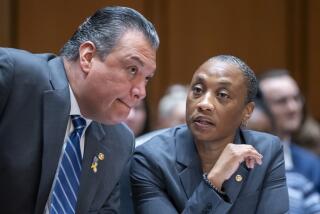Byrd Opposes Reagan’s Aid Plan for Contras, Urges Diplomacy
- Share via
WASHINGTON — Senate Majority Leader Robert C. Byrd (D-W. Va.) announced his opposition Thursday to the Reagan Administration’s proposed $36.25 million in aid for Nicaragua’s Contras, challenging the White House to “take a diplomatic track” and test the Sandinista government’s willingness to secure peace.
If President Reagan “can sit down with the granddaddy of Marxist regimes, the Soviets, for a treaty, why not sit down with the Nicaraguans and put them to the test?” he asked. “If they (the Nicaraguans) say they are willing to work toward eliminating Soviet influence in the region, why not test them?”
Byrd, who made his remarks on the Senate floor, refused to predict the outcome of next week’s congressional vote on the controversial proposal. But he is among the most conservative of Senate Democrats and one who often waits until shortly before a vote to announce his position. His willingness to oppose the request publicly, only a day after Reagan submitted it, is a further indication that Congress’ Democratic leadership believes that the proposal--a key element of the Administration’s foreign policy--is heading for defeat.
A Curve for Colleagues
At the same time, however, Byrd threw a curve at his Democratic colleagues in the House. He indicated that he may not support their plan for an alternative package of strictly non-military aid in the region.
That package is a key element of the House Democratic strategy to counter Reagan by offering something that wavering moderates in both parties could support.
House Speaker Jim Wright (D-Tex.) expressed firm support for the idea of an alternative plan Thursday, calling it “essential” that “some positive package . . . be put together and brought up quite soon.” Wright said that he has asked Rep. Dante Fascell (D-Fla.), chairman of the House Foreign Affairs Committee, to assemble a Democratic aid package for Central America that could be unveiled before the House votes Wednesday on Reagan’s plan.
At the White House, spokesman Marlin Fitzwater rejected the Democrats’ concept, saying that only Reagan’s package of both military and non-lethal aid would “keep the resistance alive in a way that would make them a viable force. . . . We think it’s the best way to keep pressure on the Sandinistas.”
While many Democrats currently believe that Reagan’s plan will be defeated by a close margin, the Administration is hoping to turn the vote around with an intensive lobbying campaign that began even before the aid package was submitted to Congress on Wednesday. Reagan continued that campaign Thursday afternoon, meeting at the White House with undecided members of Congress.
The President will push for approval of Contra aid in an address to the nation Tuesday night, he told reporters covering a state dinner for Egyptian President Hosni Mubarak on Thursday night.
Reagan’s proposal would provide $32.65 million in assistance to the rebels. Of that money, $3.6 million would go to purchase weapons and ammunition. That “lethal aid” would then be placed into storage, or escrow, and not released as long as progress is made toward a cease-fire between the Contras and the Nicaraguan government.
Under the plan, Reagan would “personally consult” with the leaders of the four other Central American nations before releasing the military equipment.
The Administration describes the remaining money as “non-military” aid, but Administration officials concede that a large, but unspecified, portion of it would go for trucks, air transport, communications gear and other purposes that would aid the rebel war effort. Opponents of the aid request say this means that nearly all the money is, in fact, “military assistance.”
Democrats have directed most of their fire at the lethal aid, charging that Reagan could provide the equipment to the Contras even if the peace process now under way in Central America was making gains. White House officials at one point considered giving Congress a say in the release of the guns and ammunition, but they did not include such a provision in the final proposal.
“What troubles me,” said Byrd, “is the (decision for) triggering of lethal aid only in the hands of the Administration. I’m not saying I would support lethal aid if the trigger were changed, although I might vote for lethal aid at some point.”
The Senate will vote on the plan next Thursday regardless of the action in the House, under ground rules adopted by White House and congressional officials.
More to Read
Get the L.A. Times Politics newsletter
Deeply reported insights into legislation, politics and policy from Sacramento, Washington and beyond. In your inbox twice per week.
You may occasionally receive promotional content from the Los Angeles Times.











